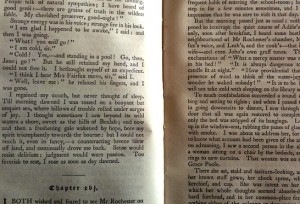
Remember back in school, when they had those hilarious competitions to see who could read the most books during the summer break? Remember how you always crushed the...
"You mean Humperdinck WINS? Jesus, Grandpa, what did you read me this thing for?"
- The Princess Bride
Sometimes it's hard to believe in the happy ending. Quite frankly, reality can get in the way.
Because when we read, we have to either forget or ignore what we know to be true about history, about human beings, about life -- in order to really enjoy that happily ever after.
After all, bad things do happen. Often, in fact.
Hell, even in the rosiest of romantic fiction, we still expect that life will keep on happening to these characters.
And we know that life, not to put too fine a point on it, can suck.
In short, we know that happily ever after comes with a caveat. Bad things happened to these characters before we met them in the pages of this book, bad things happened to them during the story contained in that book, and let's be honest, bad things are going to continue to happen to them from time to time after the book ends and their lives progress beyond the final page.
So knowing all this, knowing as we do that happily ever after is kind of a lie, why on earth do we keep on reading?
The biggest, and most obvious problem with the happily ever after ending is that we know that no human relationship remains unrelentingly awesome forever. Sure, everybody knows that the happy couple will inevitably have their ups and downs in the future, that her temper will continue to occasionally get the better of her, or that his tendency to behave irrationally hasn't completely disappeared.
But as readers, we're generally pretty willing to believe that this couple is going to be that one-in-a-million instance of two people really making it work over the long haul. They're simply going to beat the odds. Because hey, even with a one-in-a-million chance, there's still got to be that one, right?
So this doesn't really present us with too much of a problem. We know these characters, we've come to care deeply about them, and we've seen them grow through adversity. We've seen them become stronger, better people as a result of whatever journey got them from Page One to The End.
By the way, if none of these things is happening for you in the book you're now reading -- if you don't know, believe in, and care about the characters in whatever book you've currently got sitting on your nightstand -- I'd suggest that you put that book down and find one that does. Why on earth are you spending your time with those dreadful people, anyway?
What's worse than mere personal foibles harshing our little happily ever after vibe is when we know that something truly awful is about to happen in our characters' world.
By which of course I mean war.
Be honest: Even if a story apparently ends well, all promises at the altar and soft-focus kisses, don't you always feel just a little twist in your gut when you know that this story takes place in, say, England, 1936? Or anywhere in western Europe in, perhaps, 1912? What about Japan, 1940? America, 1860?
As we all know by now, the first series of Downton Abbey ended just as World War I began. We know with absolute certainty that every single one of these characters is going to suffer because of this war.
We know this. They don't.
World War I also looms over the wonderful story of A Room With a View. I've always loved the old Merchant-Ivory version with Helena Bonham Carter in the lead role of Lucy Honeychurch, of course. But the more recent iTV version, starring Rafe Spall as the romantic dreamer George Emerson, was splendid in altogether new ways. Not least of which, to me, included the newly devised final scenes that showed George dying on the fields of the Somme, and then follows an older, bittersweet Lucy as she visits the Italian pensione where it all began.
I sobbed like a baby when I watched that Rafe Spall version for the first time.
But if you've read the book, didn't you actually feel the looming presence of the war all along? Sure, maybe George dying on a battlefield isn't how EM Forster ended his novel (it isn't), but you get the sense that he meant it to be there in your consciousness. Or at least, that he fully expected it to be there.
To the audience he was writing for, they would scarcely be able to think of anything else.
Think about it. The appearance of long-haired American peace activists in a movie warns us that they're on a collision course with Vietnam. Black men and women struggling with segregation in the 1950s makes us tense up inside, preparing us for bombings in Alabama, shootings on hotel balconies. And for Forster's generation, ladies in Edwardian bustles and huge, floppy hats was a pointed visual cue that the Great War was waiting just over the next hill. And for these readers, this knowledge would have colored the whole story. Everything that happened would have been seen in the knowledge of that approaching shadow.
What becomes even more problematical is when we know something dreadful about what happens later during a character's life. Such as, for instance, an early death.
Raise your hand if you watched (and loved) Bright Star, the gorgeously produced and wonderfully acted story of John Keats and Fanny Brawne. Now raise your hand if you tried like hell not to care too deeply about their damned beautiful love story, even as they forced you to care, damn them all to hell, because you knew how it ended.
You knew that things didn't turn out well for John Keats. You knew that, and yet still you went along for the ride. You once again willingly volunteered to have your heart broken at the end of two hours' time.
Young Victoria is another one. Wonderful. Show us the touching story of two people falling in love and simultaneously learning how to shoulder great power -- and all the while you are just merrily distracting us from the fact that Albert dies young, and that Victoria never, ever gets over his loss.
We know this. We know this! So why do we sign up for it? Why the hell do we step up to the plate every single time, knowing that we are just going to have our hearts shattered against the inside of our ribcages again?
I'll tell you why.
We show up for these stories because we have to believe that people can prevail. Despite everything.
The point is that whatever lies beyond the final page, we have to have seen our characters -- fictional or real -- learn and grow and become the kind of people we can believe will triumph over it all anyway.
Happily ever after isn't about bad things never happening to these people again.
Happily ever after is about knowing that these people are going to come through it, because of what we've seen them become over the course of our story.
If it's a romance novel, then what we see on Page One should be two people who probably aren't going to get through it all alone, not as they are today. By the end of the book, they will have changed, grown in some material way, because of the relationship they have with each other. They are the catalyst for each other's growth, and because of this, by the end, we know that they'll be okay, no matter what life throws at them next.
They will, in short, prevail.
In romance, it's love that has this transformative power. In other genres, it's something else. The fulfillment of a quest, say, or the coming-of-age. The road trip. Take your pick.
That's what happily ever after really promises us. Life doesn't stop being life. But you can get better at facing life. And here's how these folks did it.
And if the book you're reading right now doesn't do that for you, put it down and find one that does.

Remember back in school, when they had those hilarious competitions to see who could read the most books during the summer break? Remember how you always crushed the...

Things that are mostly true about me